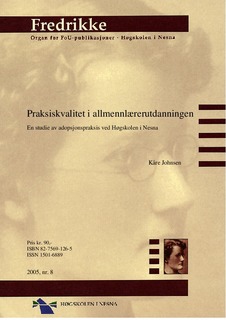| dc.description.abstract | Studies in Norway and some other western countries show that teachers are less satisfied with their education, particularly in view of claims and challenges they meet in schools after finishing their education. These findings have created a need for alternative thinking about teacher education in general and the part of the education linked to training in schools and the interaction between theoretical studies and practice in particular. School adoption implies that a group of teacher students undertake the total responsibility for
planning and implementation of teaching at an elementary/secondary school (6 – 16 years).
The school adoption is for a limited period (1 – 3 weeks), and a written agreement is made between the local school authorities, the single schools and the teacher education institution. This is an alternative to the traditional training situation, where the students are under control of an experienced teacher and follow his class and pupils, and it is a training situation which is more close to the real situations students meet when they start working after finishing their
education. Our experiences with school adoption practice have opened new perspectives on training in teacher education and have inspired students and other participants within the educational system.
The first chapter of this study is a historic review on teacher education training in Norway with focus on central ideas. Chapter 2 has a focus on the theoretical base of the study, where theories of teaching professions and assessment of quality is discussed. In teacher education two different theories of teaching professions must be taken into account in a complementary understanding: The
apprenticeship learning theory and the action and reflection theory. The investigation plan and methods of data presentation is described in chapter 3, where the investigation includes answers from students, teachers, pupils and parents on a questionnaire
concerning their experiences with student adoption at the local school. Main focus is however on the experiences of the teacher students. Chapter 4 consists of an analysis of the results, and an assessment of the results is presented in chapter 5. Short summary and evaluation of results - Students learning outcome:
• Real responsibility: "We have experienced social responsibility, we have had freedom
to plan our own work in a real setting."
• Self development: "This practice taught me much about myself, it taught me to believe
in myself, my own possibilities and own decisions."
• Cooperation learning: "The close cooperation with student colleges taught me much, we discussed problems as soon as they appeared, we helped each other the best we
could."
• Creative development: "Everything didn’t come out the way we had planned, but we
learned to solve such challenges, we learned to improvise."
• Experience the school reality: "We learned how to handle pupils with different needs
and behaviour, traditional student training (following the class and pupils of an
experienced teacher) is fragmentary."
• Comment: School adoption practice compared with traditional student training: 67%
said that their own learning outcome was better with school adoption.
Teachers experiences:
• "Our pupils liked to have student teachers, many new things happened that created change and joy, and we have learned a lot from the students ways of teaching."
• "The students have followed up our plans and agreements." Some few teachers stressed however that progression in subject matter had stopped.
Pupils experiences:
• Most pupils (96%) said they enjoyed having students as teachers.
• Many (83 %) said their learning outcome was corresponding to having their permanent teachers.
• Many pupils appreciated new methods an ways of teaching Parents experiences (through observation of their children):
• Most parent answers confirm the answers of the pupils concerning appreciation and
learning outcome.
• Several parents made a point of implementation by the students of new ideas and methods in the school.
Assessment of Quality
An analysis of central historic and theoretical findings (chapter 1 and 2) comes out with four basic requirements for quality in training /practice periods in teacher education: 1. The students self development. 2. A system of support in the students process of learning. 3. Authentic training/practice situations. 4. A relationship or link between the theoretical and practical part of the teacher education. A further analysis and categorizing of the answers of the users (students and teachers) show a large correspondence between answer categories and the 4 quality categories based on theory. This correspondence is a valid criteria for saying that students adoption practice/training is a good basis for securing quality in teacher education.
With reference to the 4 criteria, a relational model that will function as a tool for evaluating quality in teacher education has been developed. These 4 elements will be a basis for development of the individual student as a teacher. The elements are mutual dependent and cannot be evaluated isolated. Further the last half of the raining/practice periods is recommended to be class-and school adoption. In order to reach the objectives stated in the 4 criterias of quality in teacher education there is a need for system changes – with more focus on the development of the individual student. This will create a need for other priorities and a new organization of the education. There is
however a need for more innovation and research to find out how this can be done. | en |
